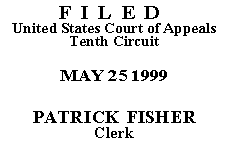

| UNITED STATES OF AMERICA,
Plaintiff-Appellee, v. ANTHONY MICHAEL MORALES, Defendant-Appellant. |
|
Defendant was convicted in 1993 of two counts of being a felon in possession of a firearm and was sentenced, inter alia, to 90 months in prison on each count, to be served concurrently. His convictions and sentences were affirmed on appeal. United States v. Morales, No. 93-2284, 1994 WL 715914 (10th Cir. Dec. 27, 1994) (unpublished). In February 1997, he filed the instant motion pursuant to 28 U.S.C. § 2255 raising seven grounds for relief in seeking to vacate his convictions. After the district court denied six of the grounds, defendant filed a notice of appeal (No. 97-2278), which was voluntarily dismissed (as premature) on January 7, 1998. On March 3, 1998, the magistrate judge issued proposed findings and recommended denial of the remaining ground for relief, ineffective assistance of counsel. Having received no objections to the magistrate judge's report and recommendation, the district court adopted it on March 28, and dismissed the action with prejudice. Defendant filed a timely notice of appeal, challenging only the district court's denial of his ineffectiveness of counsel claim.
We construe defendant's opening brief as a request for a certificate of appealability pursuant to 28 U.S.C. § 2253(c). However, we conclude that defendant, who has been represented by counsel in both the district court and on appeal, has waived his right to appeal by failing to file objections to the magistrate judge's report and recommendation that he challenges.
[W]e have adopted a firm waiver rule when a party fails to object to the findings and recommendations of the magistrate. Our waiver rule provides that the failure to make timely objection to the magistrate's findings or recommendations waives appellate review of both factual and legal questions. The waiver rule as a procedural bar need not be applied when the interests of justice so dictate.
Moore v. United States, 950 F.2d 656, 659 (10th Cir. 1991) (citations and footnote omitted); see also Niehaus v. Kansas Bar Ass'n, 793 F.2d 1159, 1164-65 (10th Cir. 1986). In a supplemental brief to this court regarding the waiver issue, defendant has provided no explanation for failing to object to the magistrate judge's report, but he contends that the interests of justice warrant appellate consideration of the merits of his claim. We disagree. The magistrate judge made detailed factual findings that are supported by the record, and his legal analysis based on those findings is correct. Moreover, defendant makes no attempt to show how the magistrate judge erred.
Defendant's request for a certificate of appealability is DENIED, and the appeal is DISMISSED.
Entered for the Court
Circuit Judge
*. This order and judgment is not binding precedent, except under the doctrines of law of the case, res judicata, and collateral estoppel. The court generally disfavors the citation of orders and judgments; nevertheless, an order and judgment may be cited under the terms and conditions of 10th Cir. R. 36.3.